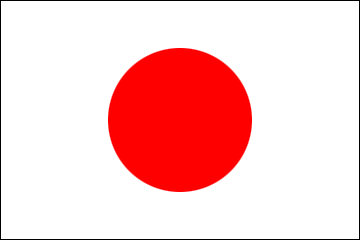UN Affairs
Besides promoting bilateral relations, the Embassy of Japan in Kenya is a permanent delegation of Japan to United Nations Environment Programme (UNEP) and United Nations Human Settlement Programme (UN-HABITAT)
and United Nations Human Settlement Programme (UN-HABITAT) which are based in Nairobi, Kenya.
which are based in Nairobi, Kenya.
Japanese Ambassador to the Republic of Kenya, who is also a Permanent Representative of Japan to both organizations, attends important conferences, including Committee of Permanent Representative, to actively represent Japan. At the same time, Deputy Permanent Representatives of Japan to both organizations who support the Permanent Representative collect useful information, exchange various opinions and coordinate with other countries and secretariats of the organizations mainly through attending sub-committees. The detail of the organizations is as follows.
1. UNEP
(1) Objective and activity of organization
UNEP is the designated United Nations entity for addressing environmental issues at the global and regional levels. It coordinates the development of environmental policy consensus through active review of the global environment such as Global Environment Outlook (GEO) and by bringing emerging issues to the forefront such as an intergovernmental science-policy platform on biodiversity and ecosystem services (IPBES) and a global legally binding instrument on mercury while fostering action by governments and the international community. Its mission is to provide leadership and encourage partnership in caring for the environment by inspiring, informing and enabling nations and people to improve their quality of life without compromising that of future generations.
In addition, UNEP is designated as the secretariats of the conventions such as the Convention on Biological Diversity (CBD) and the Convention on International Trade in Endangered Species of Wild Fauna and Flora (CITES).
2. UN-Habitat
(1) Objective and activity of organization
The UN-HABITAT is the United Nations agency for human settlements. Its mission is to promote socially and environmentally sustainable towns and cities with the goal of providing adequate shelter for all. It is dealing with a lot of issues, including the problem of slums, overcrowding in cities, de-population in rural areas, city planning, land and housing, service water and sewage, traffic, waste, building materials and mortgage. To solve these problems, the organization pursues various activities, such as research, making guidelines, exchanging information with other countries and international organizations, advocacy, training, dispatching experts and doing pilot projects.
(2) Japan’s contribution
Japan has been a member of the UN-Habitat Governing Council since its inception (The United Nations Human Settlement Centre which was established in 1978 was reorganized as the UN-HABITAT in 2002.). The Governing Council reports to the UN General Assembly through the United Nations Economic and Social Council (ECOSOC) and its members are elected by the General Assembly for four-year terms.
Japan has assisted the work of UN-HABITAT through its contributions of about $31,515,000 in 2010 (the largest donor) , including non-earmarked contribution (about $107,000 in 2010, the 8th largest donor) and earmarked contribution mainly through supplementary budget (about $31,408,000 in 2010, the largest donor) to mobilize resources for emergency situations, such as earthquakes, floods, conflicts and the like.
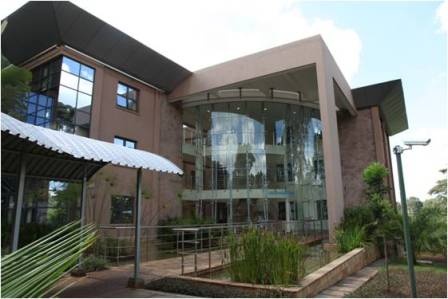
Habitat HQ
|
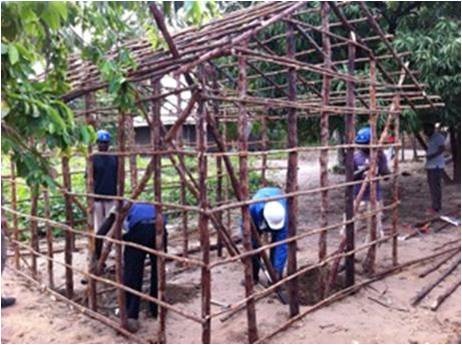
Housing Reconstruction in Mozambique
|
3. Other Main Agencies
(1) United Nations Development Programme (UNDP) Kenya
UNDP’s focus is on helping countries build and share solutions to achieve poverty reduction and the Millennium Development Goals, democratic governance, crisis prevention and recovery, environment and energy for sustainable development. On the ground in 177 countries and territories, UNDP offers global perspective and local insight to help empower lives and build resilient nations through 129 country offices.UNDP Drylands Development Centre has been implementing a project entitled Africa-Asia Drought Risk Management Peer Assistance Project with the financial support from Japan-UNDP Partnership Fund. The project provides the decision-makers and practitioners working in the drought affected countries in the two regions with the opportunities to share time-tested knowledge and exchange proven in-field experiences on drought management to help address the common objective of reducing future drought risks.
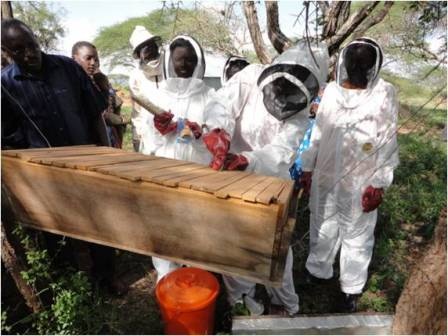 Honey mel harvest training |
(2) International Organization for Migration (IOM) Kenya
IOM is the principal inter governmental organization in the field of migration dedicated to promoting humane and orderly migration for the benefit of all. IOM works to help ensure the orderly and humane management of migration, to promote international cooperation on migration issues, to assist in the search for practical solutions to migration problems and to provide humanitarian assistance to migrants in need, be they refugees, displaced persons or other displaced people.The Government of Japan has been supporting IOM Kenya since 2009 to enhance peace-building and livelihood opportunities for migrants affected by crisis-drought or post-election violence, including pastoralists and Internally Displaced Persons (IDPs), as well as other vulnerable groups in Northern Kenya.
In 2012 IOM implemented a program on Emergency Assistance to Somali refugees in Dadaab and other refugee camps in Kenya through the supplementary budget (about USD 3 million, 2012). This was implemented to provide immediate assistance and build resilience of communities impacted by drought, the Somali refugee influx in the Dadaab and Kakuma camps and the host communities in the surrounding areas of Northern Kenya. Specifically, the project addressed the following issues: health and psych-osocial needs; livelihoods, agriculture and livestock recovery; and community dialogue and peace-building.
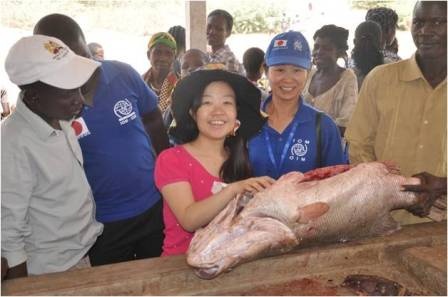 Fish Market in Lodwar |
(3) International Labour Organization(ILO) Kenya
The ILO was created in 1919, as part of the Treaty of Versailles that ended World War I, to reflect the belief that universal and lasting peace can be accomplished only if it is based on social justice. The ILO aims to ensure that it serves the needs of working women and men by bringing together governments, employers and workers to set labour standards, develop policies and devise programmes.
In 2012, ILO Kenya implemented a program on Youth Employment for Sustainable Development through supplementary budget (about USD 1.5 million, 2012). The project contributed to creation and development of Micro and small Enterprises (MSEs) owned by young men and women through provision of training in labour intensive infrastructure development and maintenance technologies such as “Do-nou”.
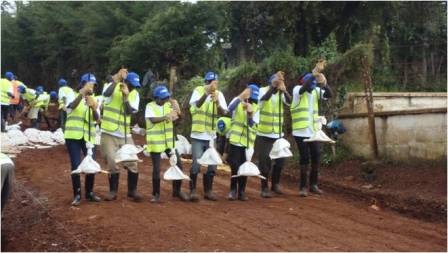
The maintenance of road by Do-nou technology
|
